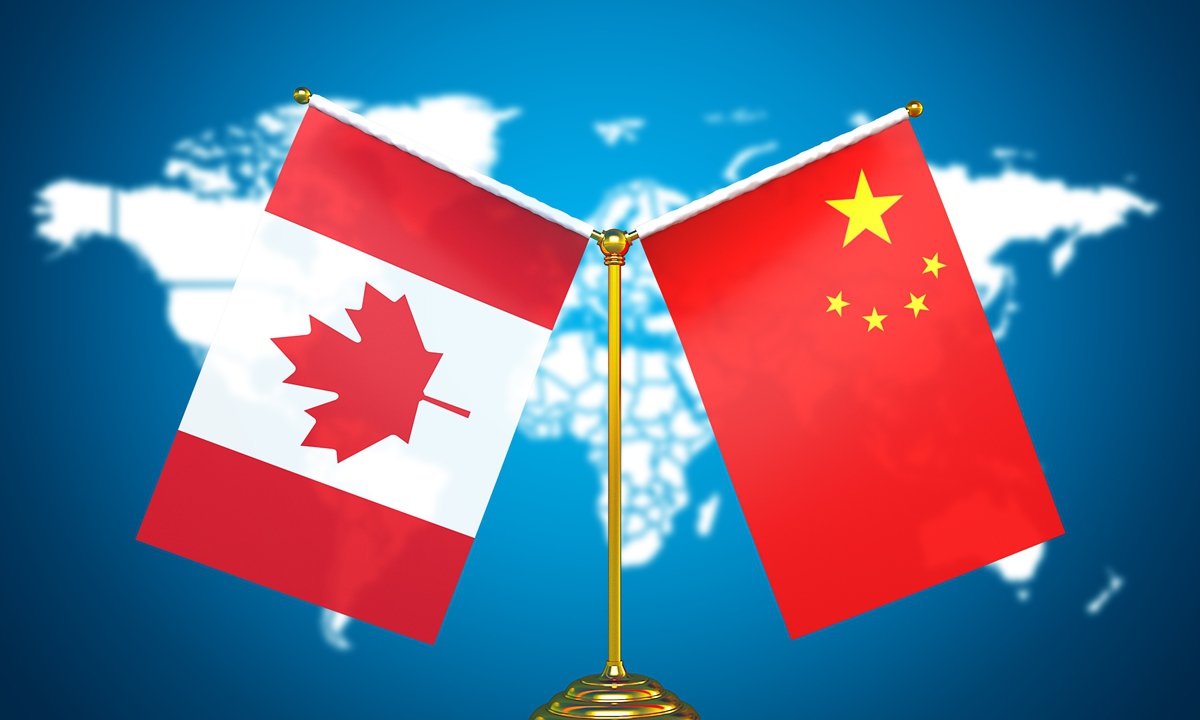
China and Canada Photo: VCG
After the new Canadian cabinet was sworn in and amid a global trade war launched by the US, many eyes are on the prospects for the China-Canada relationship.The incumbent Canadian Prime Minister Mark Carney, who was known for urging Canadian corporations to look to China just a decade ago, campaigned by labeling China as the "biggest geopolitical and political interference threat to Canada" and by rejecting boosting trade ties with China in favor of Europe. Surely, this cannot bode well for China-Canada relations. Well, not quite.
Noticeably, in recent years, the distance between election rhetoric and the reality of Canada's political and geopolitical economy has widened into a chasm - for instance, after running a campaign focused on distinguishing himself from former Canadian prime minister Justin Trudeau, Carney has appointed a cabinet filled with Trudeau-era figures. So, now that the elections are over, it is time to assess the real prospects for China-Canada relations. Once upon a time, China-Canada relations were truly bilateral - former prime minister Pierre Trudeau recognized the People's Republic of China in 1970, nearly a decade before the US, and refused to participate in the Vietnam War. Today, however, as Princess Diana famously said, "there were three of us in this marriage" and the US hulks maleficently over China-Canada relations.
Canada's integration with the US economy picked up pace in the postwar period and, by the 1970s, many scholars were warning that it was reaching levels that endangered Canadian sovereignty. Despite this, Canada's rulers deepened this integration, with the 1988 Canada-US Free Trade Agreement followed by the 1994 North American Free Trade Agreement and the 2020 United States-Mexico-Canada Agreement. Whereas the US share of Canada's exports was less than 40 percent before 1945, it peaked at 84 percent in 2002. However, it had declined to 75.9 percent in 2024. Meanwhile, while China remains a distant second, accounting for only 4.1 percent of Canadian exports in the same year, there have been great improvements since 2000 and there is great scope for growth.
For decades, this deepening integration with the US did not appear to affect the China-Canada relationship. However, unease over state-owned corporations among Canada's conservatives and, inevitably, Obama's "Pivot to Asia," were already beginning to make things difficult when Donald Trump began his first term in 2017. More or less immediately, the first Trump administration tore up NAFTA and the ensuing renegotiation put the Trudeau administration under pressure to yield trade concessions and much more. This was when Canada illegally arrested Huawei CFO Meng Wanzhou at the US's request, sending China-Canada relations into a tailspin of decline from which they are still only slowly recovering.
That tailspin was further accelerated by a new dynamic in Canadian politics in which Conservatives alleged that the Liberals were "soft on China." Of course, the Liberals fought back by alleging that the Conservatives were being soft on India and benefitting from Indian interference in Canadian elections. Carney's antagonistic statements about China must be read in this context. Over the last many years, the Liberal administration had become so unpopular due to its many economic failures that, in addition to draping himself in the flag as the only leader capable of standing up to the Trump administration, Carney not only adopted much of the Conservative platform but also its anti-China rhetoric.
Now that he is in office, he has a free hand and the realities of Canada's economic situation and prospects will play a bigger role than election rhetoric might lead one to believe. And, while Carney is likely to be friendlier to both the US and China than during his campaign, economic and political realities will dictate a major difference between the prospects for US-Canada relations and China-Canadian relations. On the one hand, certainly he will have to secure the immediate interests of Canadian businesses that are deeply enmeshed with the US and this will likely require significant concessions to the US. However, since it peaked in 2002, that enmeshment has been declining anyway and, with or without Trump, the US seems to be an increasingly unreliable and crisis-prone trade partner. On the other hand, to advance the interests of the same Canadian businesses will require reorienting them not to embattled Europe but to China, which shines as a beacon of stability, predictability and opportunity and features key complementarities with the Canadian economy on energy and food exports as well as clean technology imports.
The author is a professor in the Department of Political Studies at the University of Manitoba in Canada. opinion@globaltimes.com.cn


